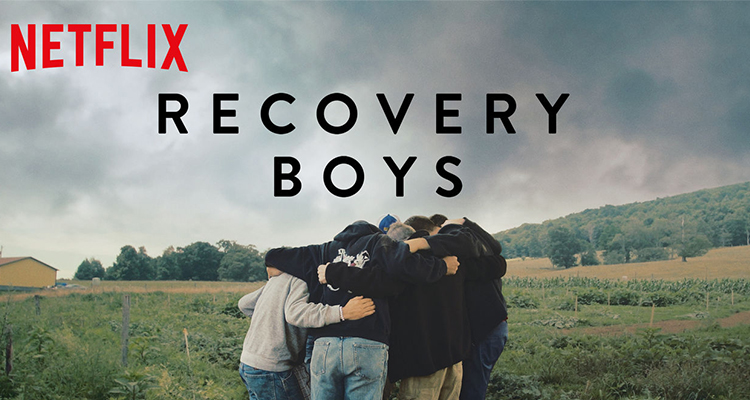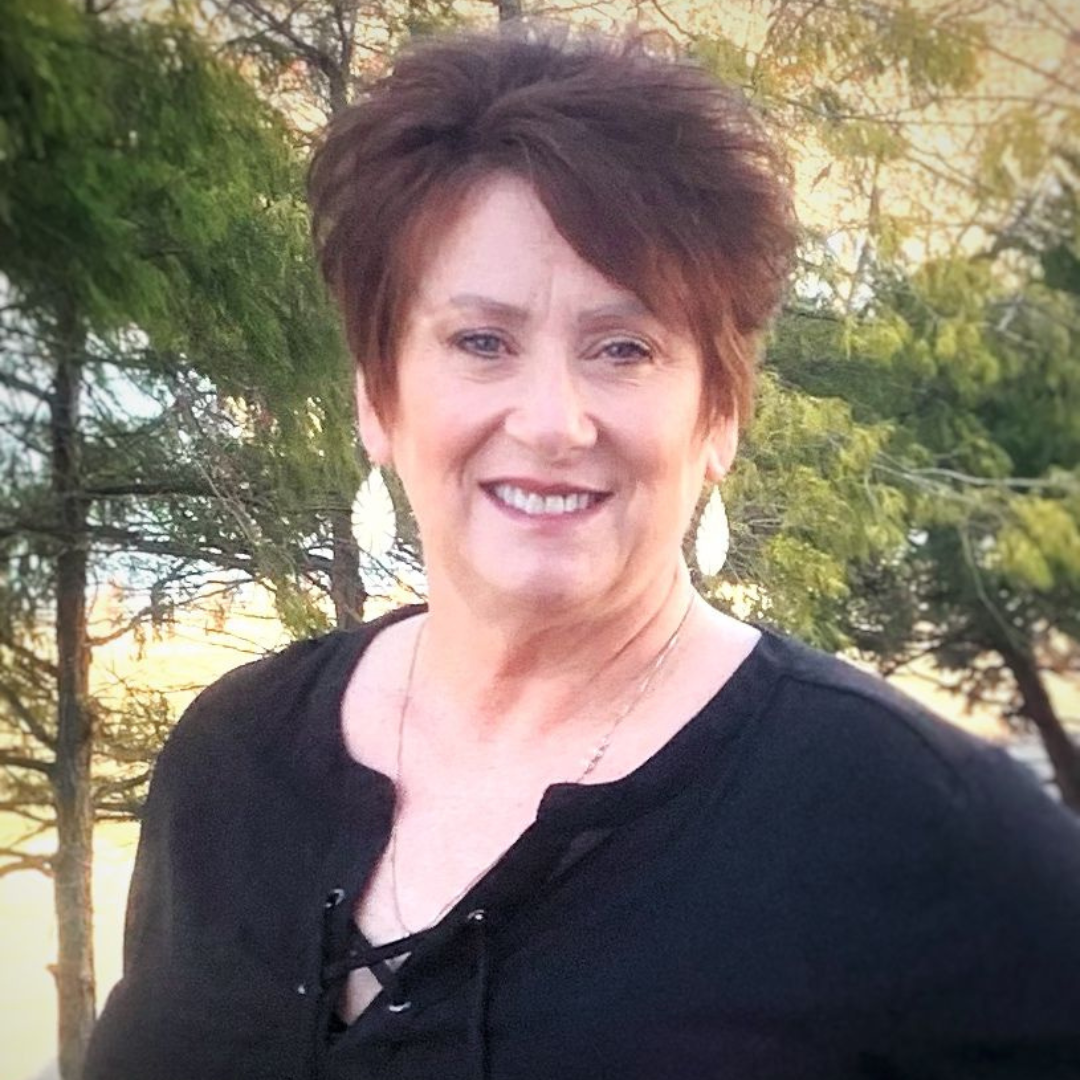As a mom myself, my heart kept breaking for their mamas — the mothers of these four young men. Jeff, Adam, Ryan and Rush are profiled in “Recovery Boys,” a Netflix film depicting the struggles of recovery in West Virginia.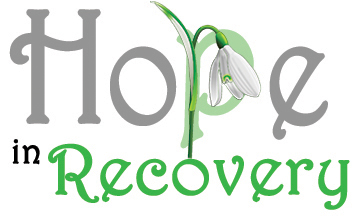
The movie follows these men for 18 months during and immediately after addiction treatment at Jacob’s Ladder, a farming-based recovery facility in Aurora, W.Va. The film, which can be viewed on Netflix, was presented recently at Wheeling Jesuit University by the Community !mpact Coalition, the Appalachian Institute and West Virginia Public Broadcasting.
An audience of about 60 community members watched a screening of “Recovery Boys” followed by a panel discussion with movie director and producer Elaine McMillion Sheldon and Jacob’s Ladder founder Dr. Kevin Blankenship, as well as featured Jacob’s Ladder client Adam and his mother Leslie.
Adam and Leslie are Wheeling residents and were publicly commended at the screening event by Wheeling city councilwoman Wendy Scatterday for their courage in sharing their personal journey in such a public forum.
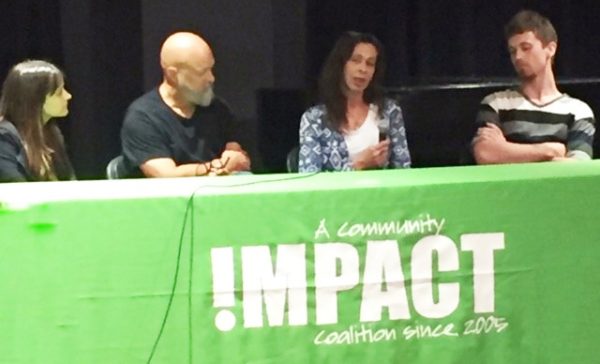
KEVIN BLANKENSHIP
Dr. Kevin Blankenship personally financed the Jacob’s Ladder houses and continues to do so today. An emergency physician by vocation, he has educated himself about addiction and recovery in response to his own son’s struggle with substance use disorder, or SUD.
“I see my son in each one of these guys,” Dr. Kevin says gently. “They’re all family to me.”
Dr. Kevin says he’s learned that treatment is never “one size fits all.”
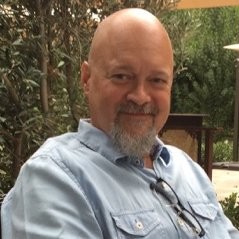
“Treating addiction is a learning process,” he told the group. “Jacob’s Ladder utilizes many recovery models because each person’s journey is different.”
He says that as he learned about treating SUD, he was fascinated with the neurological component of the disease. He told us that the brains of those who are addicted are wired differently from those who are not. He said that addicts’ brains get caught up in a “neural loop” of chasing immediate gratification and that their brains are no longer able to focus on anything beyond the moment. Dr. Kevin learned that the recovery process allows the brain to heal and then be retrained to once again comprehend delayed gratification. For this reason, he chose the farming model of treatment for the clients of Jacob’s Ladder.
“Farming is about waiting,” Dr. Kevin said. “You plant a seed and wait for it to grow. There is a cycle for both plants and animals that takes time.”
Allowing the clients to work and participate in this “waiting” environment in the early stages of recovery allows their brains the necessary time to heal. The men are taught to perform all the farming chores, and the meat and produce that they garner is used to supply the Jacob’s Ladder kitchen.
ADAM AND LESLIE
Leslie told the group that in order to get Adam started on the road to recovery, it was necessary for her to press charges against him and have him incarcerated. He was stealing from his mother to support his habit. Once he was released from prison, Leslie searched for treatment options for her son.
“I was angry and disappointed with some of the local options,” she said. In Leslie’s opinion, Wheeling lacks sufficient long-term in-patient options. “The typical 28-day programs that insurance companies will pay for are not adequate to treat years of substance abuse and in many cases, a lifetime of trauma,” she asserts. She happened to see Dr. Kevin on a news broadcast and reached out to him for help for her son.
Adam said that, initially, the biggest obstacle to his recovery was himself. He said that until someone is ready to stop using drugs, no amount of help or support is going to work. “You have to want to help yourself,” he said. Once he made the decision to stop using, Adam said it was his mom’s support that made the difference for him.
“She loved me when I was unable to love myself, and I couldn’t have done this without her,” he said. He told the group that he would not have been able to succeed without Leslie’s love, support and perseverance. Dr. Kevin agrees with Adam and says that he’s found that of the 40-plus graduates of Jacob’s Ladder, those with supportive, stable families are the most successful in recovery.
Leslie is still a major part of Adam’s recovery, especially now that he’s back in his hometown where his drug use began when he was a teenager.
“If I wanted to, I could walk down the street and get high right now,” Adam says. He told the group that the local drug supply is readily available to those who want to access it and that many townsfolk would be shocked at just how easy it is to buy drugs on the streets of Wheeling.
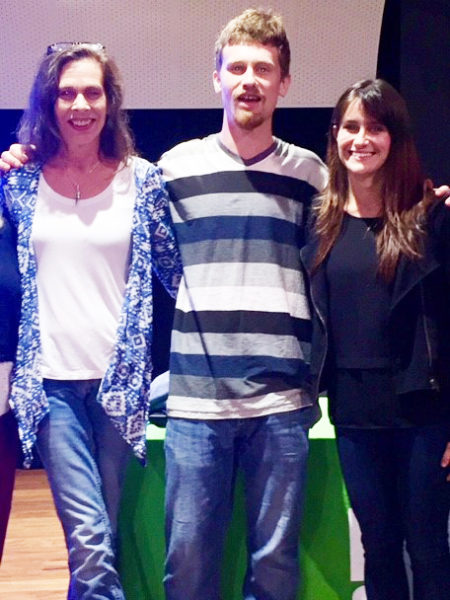
ELAINE McMILLION SHELDON
Academy Award- and Emmy-nominated director Elaine McMillion Sheldon and her husband Kerrin Sheldon produced “Recovery Boys” as well as another documentary on West Virginia’s opioid epidemic, “Heroin(E).” Elaine was named one of the 25 New Faces of Independent Films by Filmmaker Magazine and is a founding member of All Y’all Southern Documentary Collective.
According to Elaine, there are so many other addiction stories to be told in our state. Other possible topics she’s investigating are the unique challenges and issues the epidemic poses for women, as well as the effects and consequences of neonatal drug exposure.
Elaine’s work in “Recovery Boys” showcases much of the natural beauty of our state and of farm life. It also highlights just how much pain is hidden in our gorgeous hills and valleys due to the opioid crisis our state currently faces.
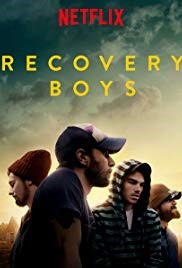 A SCENE FROM THE FILM
A SCENE FROM THE FILM
At one point in the film, Jeff, Ryan, Rush and Adam attend Overdose Awareness Day at the West Virginia State Capitol building in Charleston. During this event, those who have lost loved ones to drug overdoses are invited to place a pair of the deceased’s shoes on the Capitol steps to represent their life. I was moved to tears at the sight of all those Converse, Nikes, Timberlands and Uggs lined up in remembrance of my home state’s children who have succumbed to their demons.
Watching “Recovery Boys” makes the viewer root for these four men and hope that all of them turn out to be well in the end. You want all of them to succeed in their recovery journeys. But unfortunately, hoping and wishing do not work. What Dr. Kevin says does work is flexibility in treatment, compassion from society and a solid support system in recovery. He says there needs also to be widespread recognition of the fact that relapse and repeated treatment are part of the path to wellness.
If you know of a group who would like a screening of the movie “Recovery Boys,” visit Recovery Boys the Film to schedule a screening. To make a donation to the Jacob’s Ladder Assistance Fund, visit their donation page.
“THE NEW ‘ROCK BOTTOM’ IS DEATH”
Leslie mentions that we used to think that addicts needed to “hit rock bottom” in order to be compelled to successfully seek treatment. Today, however, the prevalence of fentanyl on the streets complicates the notion of “rock bottom.”
“The new ‘rock bottom’ is death,” Leslie warns. And unfortunately, she’s correct. “Every 11 hours, someone dies of an overdose in West Virginia,” Dr. Kevin said. “We need to do all we can to be compassionate and help remove the stigma surrounding addiction.”
Leslie believes that the three most dangerous words regarding SUD are “Not my child.” She says one of the first steps toward overcoming the stigma of addiction is realizing that it could be any of our children. “Addition doesn’t discriminate according to race, gender, education or socio-economic status,” Leslie says. “It can happen to anyone.”
JEFF
For those who have already seen “Recovery Boys,” you know that at the end of the film, the status and whereabouts of Jacob’s Ladder client Jeff are unknown. Dr. Kevin reports that Jeff reached out to him after the film’s debut and let them know that he’s alive and living “somewhere out West.” Jeff reports that he is clean and has found employment, but despite this positive turn of events, his two young daughters have been placed in foster care.
If you or someone you know is struggling with fentanyl addiction, please visit this comprehensive guide provided by the Drug Helpline.
• A lifelong Wheeling resident, Ellen Brafford McCroskey is a proud graduate of Wheeling Park High School and the former Wheeling Jesuit College. By day, she works for an international law firm; by night, (and often on her lunch breaks and weekends) she enjoys moonlighting as a part-time writer. Please note that the views expressed in her writing are solely her own and do not necessarily reflect those of anyone else, including her full-time employer. Through her writing, Ellen aims to enlighten others on causes close to her heart, particularly addiction, recovery and equal rights. She and her husband Doug reside in Warwood with their clowder of rescued cats, each of whom is a direct consequence of his job as the Ohio County Dog Warden. Their family includes four adult children, their spouses and several grandkids.


